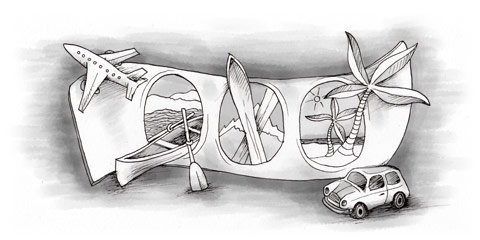Snooker is a highly popular sport and most large towns boast at least one snooker or billiards club. Many hotels, bars and sports clubs also have snooker tables. Snooker clubs, most of which have bars and many also restaurants, often open from around 10am to midnight daily. In the last few decades, the popularity of snooker has increased tremendously, owing mainly to the success of televised championships. These have transformed what was once a minority pastime with a seedy image into a successful national sport with a huge following. (It’s estimated that over 8 million people play the game in the UK). Professional competitions are now held throughout the world and top players are millionaire celebrities. Snooker is played increasingly by women, professionally as well as for fun, and they make up a large part of TV audiences.
Billiards, however, is waning in popularity, although it still arouses considerable interest elsewhere in the world. American pool is also played fairly widely, although it’s very much the poor cousin of snooker and to a lesser extent billiards. A game called 8-ball, commonly played in pubs, with teams competing in local leagues, is also held in affection along with bar billiards.
Gymnasia & Health Clubs
There are gymnasia and health and fitness clubs in most towns, where sadists are employed and masochists go to torture themselves. Working out is popular and many companies provide their own health and leisure centres or pay for corporate membership for staff. In addition to many private clubs, most public sports and leisure centres have tonnes of expensive bone-jarring, muscle-wrenching apparatus, designed to get you into shape or kill you in the attempt. Middle-aged ‘fatties’ shouldn’t attempt to get fit in five minutes (after all it took years of dedicated sloth and over-eating to put on all that weight), as overexertion can result in serious sports injuries. A good gymnasium or health club will ensure this doesn’t happen and carries out a physical assessment, including a blood pressure test, fat distribution measurements and heart rate checks. In your pursuit of the body beautiful, it pays to give the intensive care unit (or mortuary) a wide berth.
Most sports and leisure centres have a health and fitness club or circuit training and exercise rooms, where supervised weight training sessions are held (single sex and mixed). Non-supervised users may require a special card to show that they’re competent users (that body-destroying equipment is no joke). Membership of a public club isn’t usually necessary, although membership may confer preferential booking facilities and the free use of equipment at certain times. Some sports and leisure centres charge an annual membership fee of around £50 or more (e.g. in London). Peak use of the fitness room is around £5 an hour or per session on a casual basis and there’s often a lower charge during off-peak times (usually 9am to 5pm, Mondays to Fridays).
Charges can often be reduced by purchasing a book of tickets (e.g. ten sessions). Many sports and leisure centres also provide a huge variety of exercise classes, including t’ai chi, high impact (energetic) and low impact (gentle) aerobics classes (e.g. callanetics), yoga, aqua-aerobics (in the swimming pool) and various dance routines. Some centres hold dance and exercise classes for all ages and levels of fitness (from beginners to superpeople), during the daytime (including weekends) and evenings. Always check the class standard before enrolling.
Private Clubs
Private health and fitness clubs are popping up overnight in all areas in what is a huge growth market. The cost of membership of a private club varies considerably, depending on the area, the facilities provided and the local competition. It’s generally around £300 a year for a single person, although this can be reduced by up to a third by taking advantage of off-peak reductions (usually before 5pm, Mondays to Fridays). Casual attendance (if permitted) usually costs between £5 and £10 a session. Some clubs offer reduced rates for husband and wife or family membership. Charges seem to be falling in some areas where an inordinate number of people joined up primarily because it was a prevailing fad, and then eventually got fed up with all the grunting and groaning. Clubs are usually open seven days a week from 7 or 8am until around 10pm. On Saturdays and Sundays, some clubs may be open only from around 9am to 1pm.
All clubs provide a free trial and assessment and produce personal training programmes for members. Many private health and fitness clubs organise aerobics and keep-fit classes, have a sauna, solarium, Jacuzzi, and steam bath, and provide massage and aromatherapy. Many top class hotels have health clubs and swimming pools that are usually open to the general public, although access to facilities may be restricted to residents at certain times.
This article is an extract from Living and working in Britain. Click here to get a copy now.


